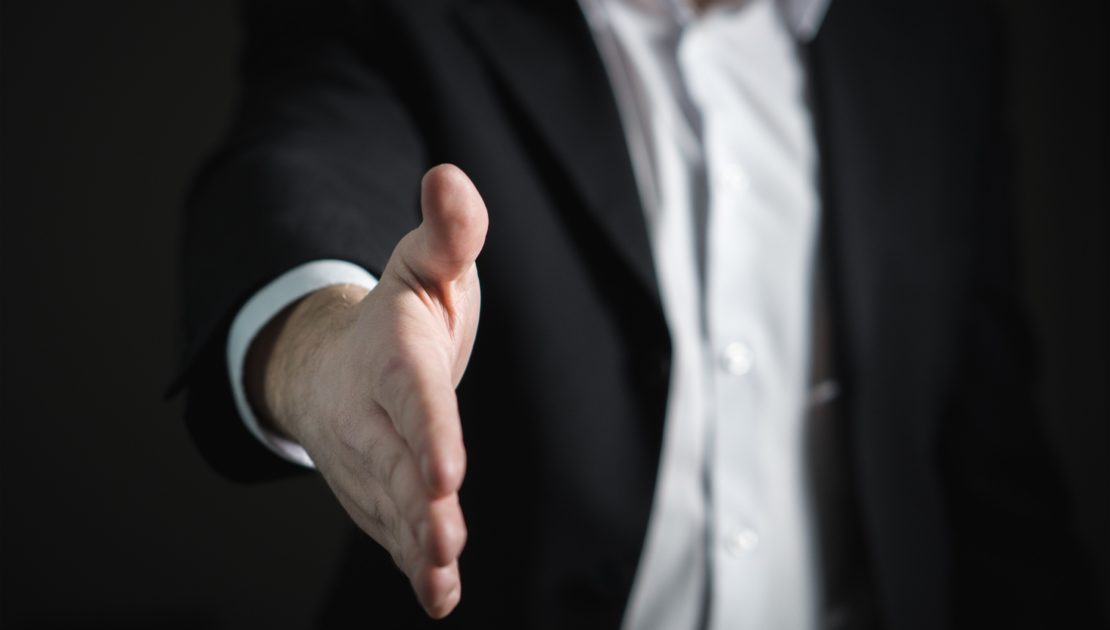A Reflection on National Good Neighbor Day
- September 28, 2019
- Posted by: Joseph Deitch
- Category: Uncategorized

Imagine this: You walk up to someone, smiling, and extend your hand.
What happens next in that scenario?
They reach out their own and shake your hand, don’t they? Of course they do. It happens countless times every day – so often, in fact, that we don’t think twice about it. Handshakes are a ubiquitous example of an innate human tendency.
It’s called the Law of Reciprocity, and on National Good Neighbor Day (September 28), it’s a good thing to keep in mind.
We’re instinctively moved to give back in a way that seems commensurate with what we’ve been given. It’s human nature. Put another way: It’s the Golden Rule (“Do unto others as you’d have them do unto you”) in action, and it’s all around us every day.
The Golden Rule is the undisputed champion of moral principles. Though often ascribed to Christianity, the first written reference dates back to 2000 BCE and the Hindu text Hitopadesha, which stated “One should always treat others the way they wish to be treated.” No doubt it was in place long before that, however – in fact, most major religions and philosophies contain some version of this peerless adage. It’s embedded in our DNA.
This concept embodies what it means to be a good neighbor. Too often, though, people see exclusion as a virtue when it comes to being a neighbor.
“Good fences make good neighbors” goes the saying, but taken to the extreme it can divide us rather than unite us. We all want to be a part of something bigger than ourselves… a larger community where we can live, love, and be ourselves. Being a good neighbor helps to create that space, no matter where you are.
Ever have someone in your place of work bring homemade cookies in for the team? They’re not just bringing in cookies, they’re sharing some warmth with you. Your inclination, if you’re anything like me, would be to give something back to them. It starts a chain reaction of giving… Reciprocity can run rampant in the best way imaginable!
If you don’t bring in those cookies – or extend your hand – then… well, nothing happens. Making the effort to cultivate good neighbors, on the other hand, not only creates moments of connection — it often means that you’re creating a bond that lasts. Because if you cultivate good neighbors, they’ll be there for you when you need them.
Consider the aftermath of Hurricane Dorian.
It’s now been almost a month since that storm — the strongest ever seen in this part of the Atlantic – devastated the Bahamas in general and Abaco Island in particular.
I’m the Chairman of Southworth Development and we own The Abaco Club, a resort community on Abaco Island in the northern Bahamas. For anyone who has ever traveled to Abaco, you know that everything about the island and its people are special. These people are, in a very real way, my friends and neighbors. Which makes it all the more difficult to process the destruction and anguish the storm left in its wake.
As is always the case when things like this happen, something else emerges amid the devastation and heartache. Beloved television personality Fred Rogers once said: “When I was a boy and I would see scary things in the news, my mother would say to me ‘Look for the helpers. You will always find people who are helping.’”
I’ve seen so many helpers after Hurricane Dorian.
People like the man in Florida who went to a Costco and bought 100 generators to send to the islands.
“It’s important that we help each other out. It’s better than just sitting there,” the man, who asked not to be named, said. “You see a need and you fill it.”
Good neighbors respond.
And people like Chef José Andrés, who within 2 days of the storm, was on the ground in the Bahamas with his NGO, World Central Kitchen, and had served 15,000 meals to those in need. “A plate of food,” Andres said of his outreach to hurricane victims. “sends the message that you care, that help will eventually arrive, that things tomorrow will be better.”
Good neighbors remind you that tomorrow will be better.
I want to be there for the people of Abaco because I know they’d be there for me. I am proud to be part of the outpouring of financial support for our organization, Abaco-Winding Bay Relief Fund, which has raised $2.7 million to help the people of Abaco.
Our first concern was the safety of our employees, who I’m happy to say have all been accounted for. We are providing medical care to those who need it. And while the island rebuilds, we’ll be paying our employees full salaries so they don’t have to worry about their livelihoods while so much of their life is uncertain.
And because our property on Abaco Island was in relatively good shape after the storm, we’ve opened our doors to the brave, lifesaving non-governmental organization workers who have arrived to help. Representatives from Team Rubicon, Hearts and Hands Disaster Recovery, Shelter Box and many others are staying with us while they help the island’s residents survive the aftermath and pick up the pieces of their lives.
Sometimes when people are reaching out a hand, it’s not to shake. It’s because they need your help. I’m so proud to be a part of a community that reaches out its collective hand in return… and proves how important good neighbors are.
A final note on the word “neighbor.” It implies proximity – someone who lives on your street or in your area. But to me, location doesn’t matter. Not really.
To be a good neighbor, it doesn’t matter where you are. It matters who you are.
And good neighbors can be found everywhere.